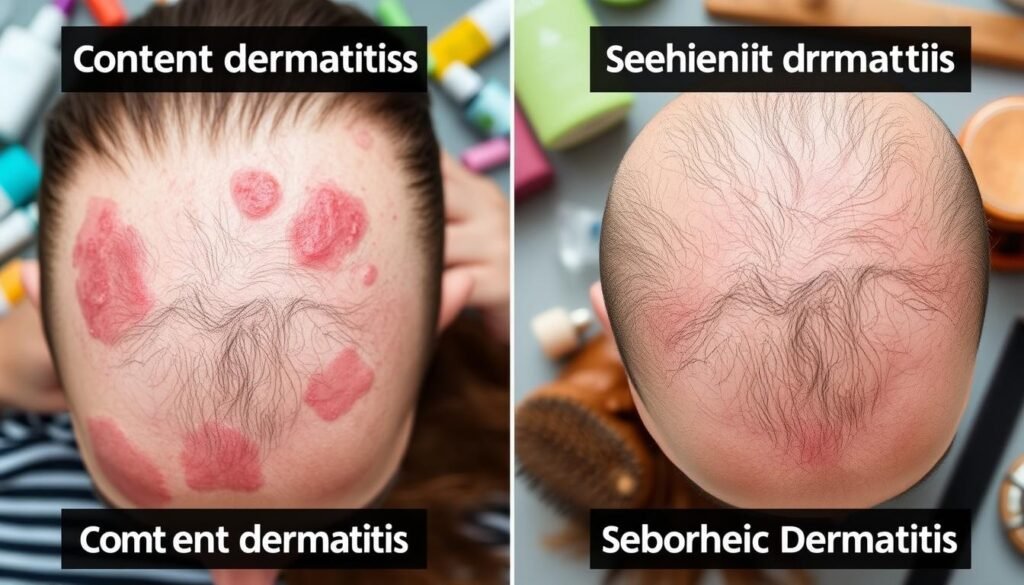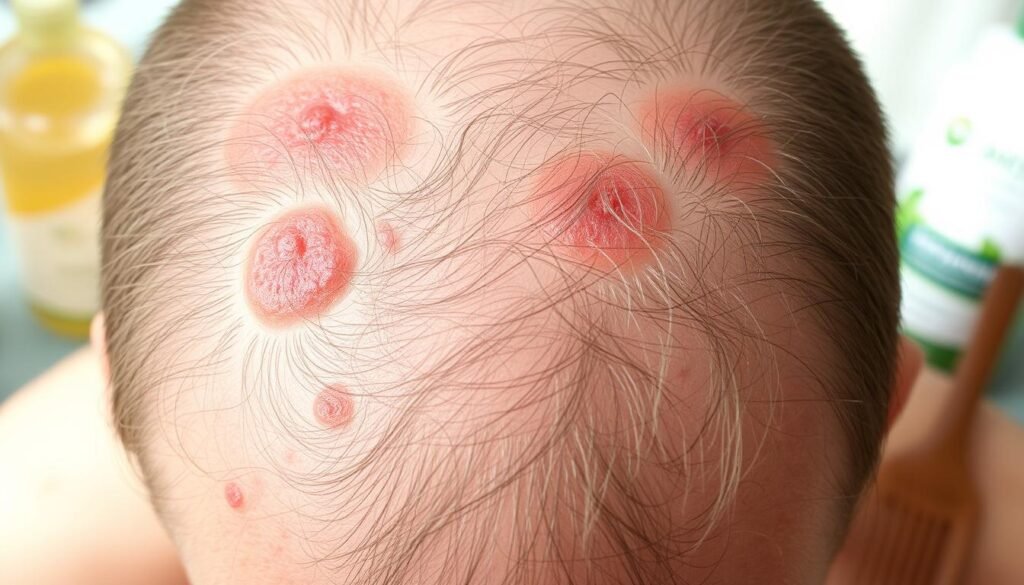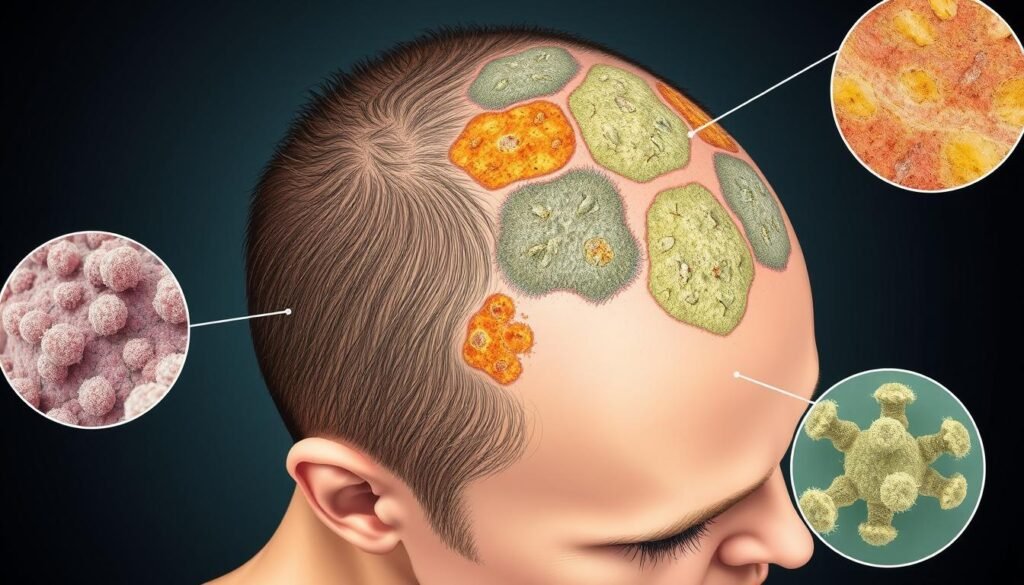Did you know half of adults get an itchy scalp sometime in their life? While dandruff might cause some scratching, long-lasting itchiness might point to more serious problems. It’s often thought scratching is just a sign of thinking hard, but really, an itchy scalp can mean things like seborrheic dermatitis or scalp psoriasis.
Getting to know what makes your scalp itch is key to finding good ways to stop it. If you tackle the itch causes early, you can avoid bigger problems, including hair loss. We’re going to look at why people scratch their heads so you can understand your own itch and find the right way to treat it.
Key Takeaways
- Nearly 50% of adults experience an itchy scalp at some point.
- Common causes include dandruff, seborrheic dermatitis, and psoriasis.
- Persistent scalp itchiness can indicate more serious conditions.
- Understanding the causes of itchy scalp can lead to better treatment options.
- Early intervention can prevent complications like hair loss and infections.
Understanding Itchy Scalp
An pruritus is the medical term for an itchy scalp. It may be caused by skin irritants, health issues, or hair products. It affects both kids and grown-ups, causing scalp irritation that can interrupt everyday life.
Different things can cause an itchy scalp, from mild irritants to serious health problems. For example, seborrheic dermatitis can cause itching and is common in people with oily skin. Conditions like psoriasis bring severe itchiness and may need a doctor’s care. Allergies to hair product ingredients, like preservatives or fragrances, can also cause skin reactions.
Folliculitis also leads to itchy scalp by inflaming hair follicles. It looks like sores or pimple-like bumps, causing discomfort and irritation. Scratching too much can worsen the condition, harm the skin, and increase infection risks. Knowing what triggers your scalp issues is key to finding the right treatment and stopping further irritation.
If your scalp itches a lot, especially with symptoms like hair loss or sores, see a healthcare expert. Finding out the cause is the first step to getting better and boosting scalp health.
Common Causes of Scratching Head
Various skin conditions often make our scalp itch. Knowing the reasons helps in finding good treatments. Conditions like contact dermatitis, seborrheic dermatitis, and scalp psoriasis often lead to itchy scalps.
Contact Dermatitis
Contact dermatitis happens when something irritates your scalp. This can be from hair products with harsh chemicals or fragrances. These ingredients can cause an allergic reaction leading to itching, redness, and swelling. People might feel discomfort on their scalp, forehead, and nearby areas. The key to dealing with it is to avoid these harmful products.
Seborrheic Dermatitis
This condition is a major cause of dandruff. It happens because of an inflammatory response to too much yeast on the scalp. Symptoms include dry, flaky skin along with constant itching. For severe cases, you might need a doctor’s help to reduce symptoms and stop hair loss from scratching too much.
Psoriasis
Scalp psoriasis, an autoimmune condition, creates scaly patches on the scalp. It leads to severe itching and can harm hair growth. Special treatments help manage it and can boost scalp health. Always seek a doctor’s advice if the problem doesn’t go away.

If you want tips on keeping your scalp healthy and easing irritation, click this link.
Symptoms Associated with Itchy Scalp
An itchy scalp can mean many things. Knowing the symptoms helps find the cause and treatment. Look for flaky skin, swollen scalp, and spots. This way, you can tackle the problem early.
Flaky Skin and Dandruff
If your scalp itches, you might see flaky skin. This is common in dandruff. It happens when dead skin cells fall off. Seborrheic dermatitis or irritations could be the cause. They create too many flakes.
Redness and Inflammation
Redness and swelling can show irritation or infection. Scalp swelling might come from allergens or infections. It shows you should get help. If the redness doesn’t go, see a doctor to check further.
Bumps and Patches
Bumps and patches on the scalp suggest skin issues. Psoriasis, for example, causes raised, red spots. This makes scalp itchiness worse. These symptoms might need special care to ease pain and heal the skin.

Fungal Infections and Their Effects
Fungal infections, like tinea capitis or scalp ringworm, harm scalp health. They cause intense itchiness, leading to worse conditions when scratched. Scalp ringworm attacks the skin and hair roots, showing various distressing signs.

Scaly bald patches, redness, and swelling may appear on someone’s scalp due to tinea capitis. If not treated, kerion, a bad reaction, might happen. This reaction can cause scarring and permanent hair loss without prompt treatment.
If left untreated, fungal infections can persist and get worse. Antifungal treatments are crucial, often involving oral medications for one to three months. Depending on the infection’s severity, medicines like fluconazole or griseofulvin are used. Since scalp ringworm is catching, it’s important to avoid sharing things and direct contact to stop its spread.
- Regularly shampooing the scalp to maintain cleanliness.
- Avoiding sharing personal items like combs, hats, and towels.
- Monitoring for symptoms of infection, especially in environments with higher exposure risks, such as schools or daycares.
Understanding fungal infections aids in prevention. Early detection and treatment can relieve symptoms and protect hair health.
Head Lice: A Common Culprit
Scalp itching is often caused by head lice, troubling both kids and adults. These tiny insects feed on human blood, causing major discomfort. It’s important to note that anyone can get lice, no matter how clean they are or where they come from. Each year, millions of people get lice, showing how common it is.
Adult lice can survive up to a month on a person’s head. They lay eggs, called nits, on hair, eyebrows, and eyelashes. The process starts with nymphs, tiny as pinheads, growing into adults in seven days. This makes finding the right treatment options crucial to stop the lice.
Many use over-the-counter shampoos with pyrethrin or permethrin for treatment. Following the directions carefully is key to them working. Sometimes, you may need to treat again if eggs are left behind. Talking to a doctor can help pick the best treatment and how to use it.
Prevention methods are vital to keep lice away. Important tips include:
- Steering clear of close contact with anyone who has lice
- Not sharing personal stuff like hats, brushes, or towels
- Knotting hair up to lessen its exposure
Regular checks for lice can catch them early, avoiding more trouble. Treating everyone who is infested and their close contacts at once is advised. This stops lice from coming back.
Skin Conditions That Cause Itchiness
Many skin issues can make you very itchy and lower your comfort levels. Atopic dermatitis, a common eczema type, is a major cause. It usually brings constant itching, skin irritation, and inflammation. This is even more of a problem if it happens on your scalp. Knowing how to handle it is key, especially for serious cases.
Atopic Dermatitis (Eczema)
Atopic dermatitis is the most common eczema kind, leading to dry and itchy skin. It can get worse from things like allergens or the environment around you. Your skin might turn red and swell up, which feels very uncomfortable. To manage it well, keep your skin moisturized, stay away from what triggers it, and use treatments that doctors suggest.
Acne on the Scalp
Scalp acne is easy to miss but it too can make your skin itch. It happens when hair roots get blocked by sweat, oil, or certain hair products. This can cause painful pimples that make you want to scratch, which only makes it worse. Keeping clean and picking the right hair products are key to handling this. If it doesn’t get better, it’s a good idea to see a skin doctor.
Treatments for Itchy Scalp
Finding treatments for an itchy scalp means looking at many options. You can choose from over-the-counter products or get a prescription. There are special items made for dealing with dandruff, seborrheic dermatitis, and psoriasis. Knowing what treatments you can use is a big step towards relief.
Over-the-Counter Solutions
Zinc pyrithione, salicylic acid, and coal tar are in many OTC shampoos. These ingredients cut down on flakes and calm the scalp. For seborrheic dermatitis, shampoos with ketoconazole are great because they fight fungus. Using these shampoos regularly can ease symptoms and improve scalp health.
Prescription Treatments
If OTC products don’t stop the itch, you might need stronger shampoos or medications. Clobetasol propionate, a type of corticosteroid, works well for psoriasis on the scalp. For serious issues like ringworm, a doctor might suggest pills. Always see a dermatologist if things don’t get better in a week for the right treatment plan.
Choosing the correct products is a key step. Being up-to-date on treatment options helps in managing itchy scalp issues. For tips on effective home treatments, check out this resource.
Preventing Itchy Scalp Problems
To stop itchy scalp problems, mix good hygiene with regular care. Knowing what causes issues like dandruff is key. Choose the right shampoos for your scalp to reduce problems.
Use hygiene practices like washing your hair often. Stay away from products that can irritate your scalp. This helps keep your scalp healthy.
Checking for head lice, especially in kids, can stop itchy scalp. Preventing itchy scalp also comes from simple changes. Keep long hair tied up, don’t share hair stuff, and be careful in places like pools.
If you have ongoing skin issues, managing them well is important. This cuts down on constant itching. Talk to a doctor for the best treatment for your scalp.
| Preventive Measures | Benefits | Recommended Products |
|---|---|---|
| Regular shampooing | Helps remove flakes and debris | Anti-dandruff shampoos |
| Personal hygiene | Reduces the risk of infections | Gentle cleansers |
| Scalp checks | Identifies lice and other issues early | Nit combs |
| Managing chronic conditions | Minimizes flare-ups | Prescription topicals |
| Avoiding shared hair items | Prevents lice spread | Personal brushes |
Conclusion
Dealing with an itchy scalp starts by understanding its causes and symptoms. Conditions like seborrheic dermatitis and psoriasis are common triggers. Knowing what irritates the scalp helps in taking early action. Keeping an eye on scalp health is key to control itching.
Treatments range from store-bought products to natural remedies, like essential oils. These can make life much more comfortable.
If the itch won’t go away, it could signal a deeper problem, such as alopecia areata. Finding the root cause and getting the right treatment is vital. For ongoing issues, talking to a doctor is crucial. Their advice can lead to better treatment plans, as noted in this article.
Beating scalp itch is about staying informed and proactive. Pay attention to any signs and take good care of your scalp. By doing so, discomfort can be reduced, improving scalp and hair health.